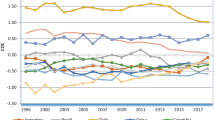Abstract.
This paper uses panel data from African countries and a dynamic panel estimator to investigate the effects of corruption on economic growth and income distribution. I find that corruption decreases economic growth directly and indirectly through decreased investment in physical capital. A unit increase in corruption reduces the growth rates of GDP and per capita income by between 0.75 and 0.9 percentage points and between 0.39 and 0.41 percentage points per year respectively. The results also indicate that increased corruption is positively correlated with income inequality. The combined effects of decreased income growth and increased inequality suggests that corruption hurts the poor more than the rich in African countries.
Similar content being viewed by others
Author information
Authors and Affiliations
Additional information
Received: March 19, 2001 / Accepted: December 14, 2001
RID="*"
ID="*" An earlier version of this paper was presented at the first AmFiTan International Conference on Development Ethics in February 2000, Dar er Salaam, Tanzania. I thank two anonymous referees of this Journal for helpful suggestions. I am, however, solely responsible for any remaining errors.
Rights and permissions
About this article
Cite this article
Gyimah-Brempong, K. Corruption, economic growth, and income inequality in Africa. Econ Gov 3, 183–209 (2002). https://doi.org/10.1007/s101010200045
Issue Date:
DOI: https://doi.org/10.1007/s101010200045




